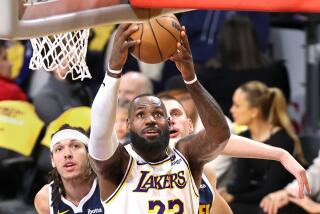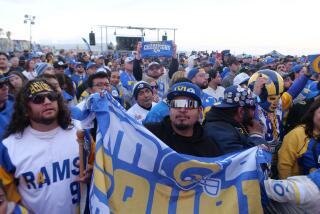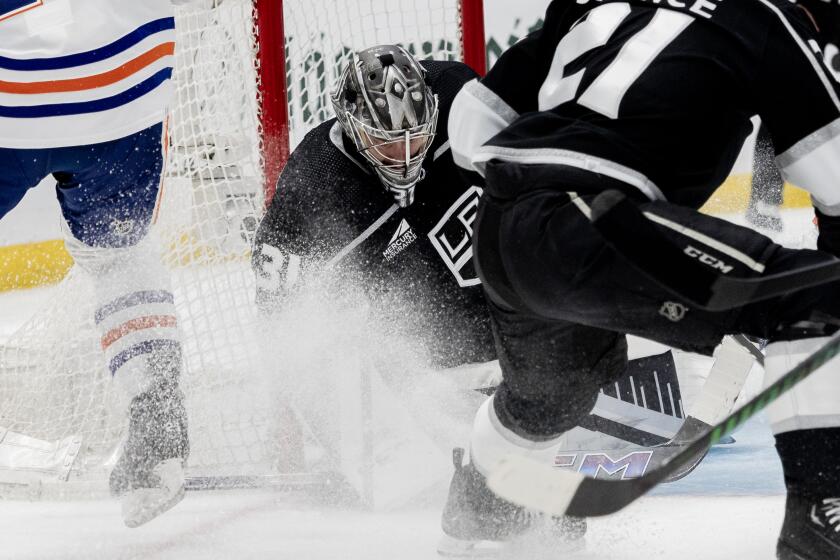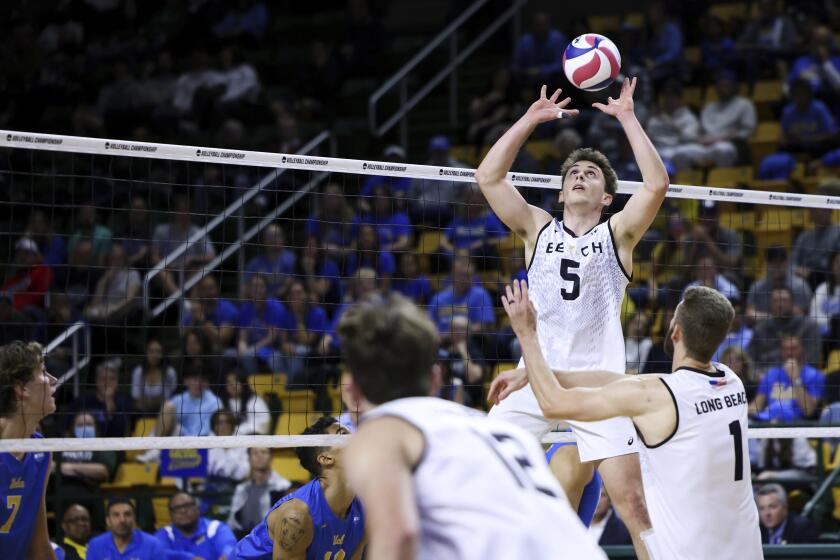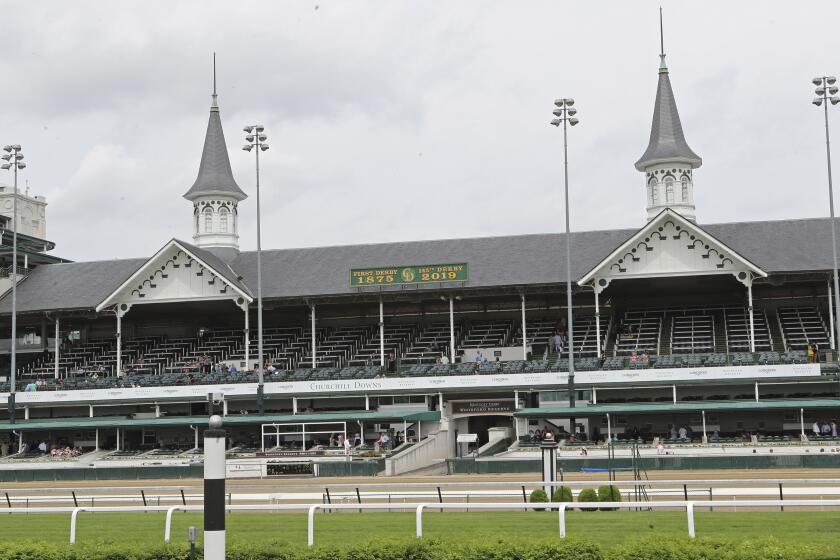Spring Training Isn’t Start, Because Season Never Ends
It is the question I am asked most often as national baseball writer of The Times.
“Well, what do you cover in the off-season?”
I cringe, bite my tongue and try not to shout, “there is no bleeping off-season anymore.”
Indeed.
It was not too long ago that baseball writers could plan on taking advantage of their frequent-flier miles to spend part of January in Hawaii.
No longer. One of the biggest changes in the baseball calendar has been its extension to 12 months.
If it’s not free agency, it’s salary arbitration.
If it’s not trades, it’s economics, labor problems and a barrage of breaking and unanticipated stories.
Here we are in mid-January and there is no respite from the winter games.
Consider the week that was:
* Dave Winfield and Kirby Puckett were notified of their selection to the Hall of Fame in balloting by the Baseball Writers Assn. of America.
* The Toronto Blue Jays traded David Wells to the Chicago White Sox in a six-player deal.
* Owners met in Phoenix and approved the inclusion of a competitive balance draft and sweeping changes in the amateur draft as part of the bargaining package they will present to the players’ union.
* The Angels signed Jose Canseco one day, then announced that Mo Vaughn may miss the season the next.
* The Dodgers avoided arbitration by signing Chan Ho Park to a one year contract and finalized the return of Ramon Martinez to Los Angeles.
* The annual arbitration filings found Derek Jeter asking for a record $18.5 million and many of the clubs--seeking to avoid the often nasty process--coming to ridiculous agreements with arbitration-eligible players.
Call it another normal week in what used to be the off-season. And while longing for Hawaii, here are some observations:
THE HALL TRUTH
Winfield and Puckett were deserving of their first-ballot selections, but how could Gary Carter be snubbed for the fifth time? Carter did register the biggest jump--from 50% of the vote last year to 64.9% this time--but that begs a familiar question: Did his statistics improve from one year to the next? If he was worthy of a Hall vote this year, wasn’t he worthy last year?
It simply makes no sense for Carlton Fisk to have been elected in his first year of eligibility with Carter still on the outside. He finished with more Gold Gloves than Fisk, more All-Star selections, more seasons with 20 or more home runs and more with 100 runs batted in. Both enjoyed the best stretches of their careers from 1977 to 1987, and Carter had the more productive statistics.
Fisk, of course, caught more games than any catcher in history, playing 23 seasons to Carter’s 19, and he hit a dramatic home run in the 1975 World Series, but for Fisk to have been elected before Carter (who has 10 more years of eligibility) proves that catchers aren’t the only people to employ the tools of ignorance.
DIGGING WELLS
New White Sox General Manager Kenny Williams felt he needed a proven No. 1 if he was going to upset Cleveland again in the American League Central and go beyond the first round of the playoffs. Wells is 71-32 over the last four years, a span in which Pedro Martinez is the only AL pitcher with more wins. Wells, however, will be 38 in April, has a body that seems ready to implode and can tee off fans and teammates with his mouth, a risk to the good chemistry that the Sox enjoyed under Manager Jerry Manuel last year.
In addition, it isn’t as if the Sox got Wells for nothing. They gave up four players, including Mike Sirotka, the game’s most valuable commodity as a young (29) left-hander who won 15 games last year, had the AL’s fourth-best earned-run average (3.79) and is about $5 million a year cheaper than Wells at this point.
On the other hand, Sirotka joins the Blue Jays in need of shoulder therapy, and payroll no longer seems as important to his former team. The Sox, given a taste of winning last year, will see their payroll double to more than $60 million. Maybe owner Jerry Reinsdorf, that renowned hawk, doesn’t think the system is so bad after all.
THE ENEMY WITHIN
Owners, of course, face an all-but-impossible task of getting the union to agree to a salary cap or restrictive payroll tax. Commissioner Bud Selig also will face the typically difficult task of holding his constituents together. The problem in getting the large-revenue clubs to share more of their income--expected to be a key plank in their bargaining package--was illustrated when Nelson Doubleday, the New York Met co-owner, aimed his big-market gun at the competitive balance draft approved by colleagues in Phoenix.
The draft would allow the eight clubs with the worst record over a three-year span to select players from the eight clubs with the best record. Doubleday heatedly argued that the draft would be a disincentive for the bottom clubs to do their own scouting and, like giving the less fortunate more revenue so that their owners can simply put it in their pockets instead of spending it on players, why should “we do all the work for them.”
Of course, management’s team has never been known for its chemistry and cohesiveness, a reason the union is 8-0 coming out of negotiations involving a lockout or strike.
FAILING HISTORY
OK hindsight is 20/20, and it is easy to say now that the Angels should have demanded and Vaughn should have insisted on a comprehensive examination of his left arm when he played in pain throughout September and continued to experience discomfort in early winter.
Forget hindsight. The Angels should have learned from recent history.
Didn’t Jim Edmonds chose water skiing over therapy and/or surgery for his ailing shoulder during the winter of 1998 and didn’t the Angels regret not ordering him to have it repaired before he finally had surgery in April and missed most of the 1999 season?
Given their $80-million investment in Vaughn and his importance to an offense that will seemingly have to carry a suspect rotation again, the Angels seemed neglectful in not getting a definitive answer on Vaughn in October. No insult to Wally Joyner or Hal Morris or Henry Rodriguez, but there is no compensating for Vaughn’s loss now. Nor can Canseco be expected to recapture a page from his youth. Relying on recent history again, he is more apt to join Vaughn on the disabled list.
THE CHAN HO GAMBLE
In electing to sign Park to a one-year contract instead of insisting on a multiyear, the Dodgers may pay a stiff price. If the 27-year-old right-hander, eligible for free agency when the season ends, duplicates his 18-7 performance of last year, he could demand a package surpassing Mike Hampton’s eight-year, $121-million deal with Colorado or the Dodgers could lose him to a hungry market.
Sources insist that General Manager Kevin Malone wanted to sign Park to a multiyear agreement now but that chairman Bob Daly bowed to pressure from the commissioner’s office. The Dodgers had already angered industry labor officials with their $55-million signing of the sub-.500 Darren Dreifort and were pressured not to give a landmark, multiyear deal to Park before he became eligible for free agency--even though the industry has learned that locking up young players and buying out their early years of arbitration and free agency is the less expensive way to go.
Instead, the Dodgers signed Park for one year at $9.9 million, a landmark contract in itself for a pitcher with only five-plus years of major league service and a lofty starting place for the potential multiyear deal that will follow.
HERE COMES DA JUDGE
The one thing to remember about salary arbitration is that 90% of the cases are settled before they go to a hearing and the players never lose.
Even if the arbitrator selects the salary that the club submits, it generally represents a sizable raise over the player’s previous salary.
In the case of Jeter, who made $10 million last season and filed at $18.5 million compared with the Yankees’ $14.25 million, he is ultimately expected to sign an eight-year contract for about $180 million. He is eligible for free agency next winter, and the Yankees are reluctant to let it come to that, fearful that the Prince of New York could move to the Mets.
Might that happen? Could Jeter move to Queens?
Chances of that are even less than a baseball writer finding time for a winter vacation on Waikiki.
More to Read
Get our high school sports newsletter
Prep Rally is devoted to the SoCal high school sports experience, bringing you scores, stories and a behind-the-scenes look at what makes prep sports so popular.
You may occasionally receive promotional content from the Los Angeles Times.

